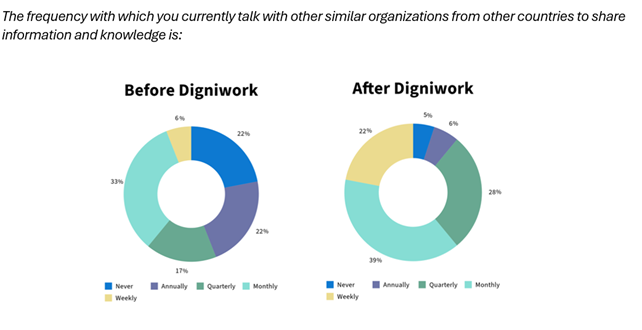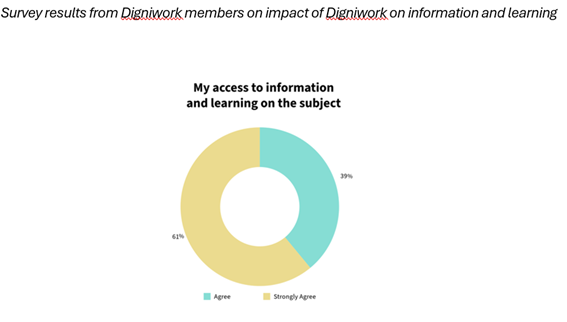
Migrant workers play an indispensable role in sustaining Europe’s agricultural production, particularly in countries like Italy and Spain, which supply much of the fresh produce found on UK supermarket shelves. These workers, many of whom travel from North and West Africa in search of better opportunities, often perform the physically demanding tasks, such as planting, harvesting, and packing crops in rural and remote areas.
While their contribution is critical, migrant agricultural workers frequently face exploitative conditions: low wages, unsafe working environments, long hours under extreme temperatures, poor housing, limited healthcare access, and a constant threat of abuse. Many are heavily indebted due to recruitment or migration costs and lack secure legal status or awareness of their rights, making them even more vulnerable to modern slavery and exploitation.
To help address this urgent issue, the Ethical Trading Initiative (ETI), supported by funding from the UK Home Office’s Modern Slavery Innovation Fund, launched the Grievance Mechanisms in Agriculture Project (GMA) in January 2023. The GMA set out to test new ways to assess and implement effective worker-centred grievance mechanisms while also considering ways to inform workers of their rights before entering the supply chain as agricultural labourers.
One of the project’s most innovative outcomes is Digniwork, a transnational network connecting grassroots civil society organisations across Morocco, Tunisia, Côte d’Ivoire, Italy, and Spain. Following research conducted by Partner Africa, which mapped geographical areas, migratory routes, and key risks faced by migrant workers in agricultural supply chains in Italy and Spain, ETI and Partner Africa supported civil society partners to launch Digniwork in March 2024. The network was created to promote decent work and safeguard the rights of migrant workers in agriculture throughout their migration journey – from departure in Africa to arrival and work in European farms.
Unlike many initiatives focused solely on destination countries, Digniwork bridges the gap between source and destination, working to prevent exploitation before it happens. The network’s goal is to amplify and support the work of local organisations – many led by former migrants themselves.
Specifically, the objectives of the network are to:
- Create connections between like-minded organisations, enabling more regular communication.
- Support these organisations to share accurate information about migration risks, workers’ rights and vital knowledge about national laws in key destination countries (Italy and Spain).
- Create a trusted support system where participating organisations can refer vulnerable migrants to access help.
- Support the members to advocate collectively for safer and fairer conditions for workers.
Activities undertaken
The network’s early months demonstrated both its potential and the challenges of building collaboration across borders. Following its launch in spring 2024, Digniwork engaged members through a mix of national meetings, regional workshops, thematic webinars, and daily informal communication. The network connected over 40 organisations across Morocco, Tunisia, Côte d’Ivoire, Italy, and Spain.
Key activities included:
- Three national meetings in each country to introduce the project, share research findings, and build consensus on forming the network.
- A regional meeting in Rabat to co-design the network’s mission, structure, and initial strategy.
- A series of thematic webinars covering critical issues such as:
- Exploitation of migrant workers in Italy
- The Spanish legal framework for foreign nationals
- Psychological support for vulnerable migrants
Between 25 and 30 participants representing 15–20 organisations joined each session. Regular online exchanges through a dedicated WhatsApp group, email list, and LinkedIn page supported ongoing collaboration, and around 18 organisations remained active members of the network.
To ensure clear governance and shared understanding among members, Digniwork drafted its bylaws under the leadership of a designated network member. These bylaws were reviewed and formally adopted during a regional meeting held in Rabat in January 2025. They define the network’s purpose, set out who can join and under what conditions, and clarify how Digniwork is organised and governed, including the roles and responsibilities of its General Assembly and Coordination Committee.
Progress and tangible results
The network’s convening power proved valuable. Digniwork members reported increased confidence and practical knowledge about migrant workers’ rights, labour laws in destination countries, and how to support migrants effectively.
Self-assessment surveys showed clear learning progress:
Members significantly increased the frequency with which they shared information with similar organisations in other countries.

Over 75% of participants said their knowledge and understanding of migrant workers’ rights improved thanks to their involvement in Digniwork. One participant, reflecting on the workshop noted its importance in creating the connections necessary to learn real things about each other. He was “stunned” to learn how migrants in Italy and Spain were treated. Furthermore, he reflected that his understanding of the Caporalato system was reinforced, and sharpened, highlighting the elements of forced labour such as removal of documents. He was not the only one, with many people remarking to him later that it was the first they had heard of this sort of abuse in Italy.

Beyond knowledge-sharing, Digniwork members have already made a difference on the ground. For instance, a local organisation in Côte d’Ivoire, when faced with Ivorians stranded without papers in Tunisia, turned to fellow network members in Tunisia for help. Together, they managed to resolve the administrative barriers and secure proper support for the migrants. In another example, the network helped connect two Ivorian women with assistance for voluntary return and reintegration.
Education on its own can also influence the decisions people make. One participant relayed that after hearing about the situation of migrants in Italy, acquaintances of his were discouraged from making the trip, a decision they wouldn’t have made otherwise.
Challenges and lessons learned
Establishing a cross-border network from scratch is never easy. Many of the organisations involved are small, volunteer-driven groups with limited resources and varying language skills. Funding constraints and ambitious initial plans sometimes outpaced what could realistically be achieved in the short timeframe. Members found that while passion and local knowledge are invaluable, dedicated coordination, flexible funding, and careful planning are equally vital to maintain momentum and trust.
One of the clearest lessons from Digniwork’s early journey is the importance of human connection, and a major takeaway was the crucial role of dedicated coordination. Much of Digniwork’s success rested on a single, multilingual coordinator who maintained frequent, mostly informal communication with members, emphasising the need for ongoing capacity and human resources to maintain stakeholder initiatives. The network hinged not just on formal meetings and reports, but on daily, informal exchanges – quick calls, text messages, and constant reassurance among partners. This invisible yet essential relationship-building has enabled the network to respond quickly to urgent needs and build a foundation of trust across borders, but ongoing capacity will be needed to maintain the sustainability of the network in the short and medium term.
Next steps
One northern partner organisation noted the value of Digniwork, because so few programmes come with “this level of networking.” That sentiment is clearly playing out in the continued activity of the network. Since April 2025 Digniwork was no longer directly supported by the MSIF grant or ETI. However, the WhatsApp group, LinkedIn and email list remain active, with recent participation showing an interest in continued sharing of information and communication. This has included informal requests for advice between members and sharing of potential funding opportunities.
Beyond networking, the Digniwork platform remains in its infancy. Since April there has been a lack of collective action, and decisions have been hard to make. One leader reflected that the logistical and legal hurdles involved in setting up an entity were hampering fundraising efforts. Another participant noted that since April the network has operated without clear leadership, with the separate partner organisations pursuing their own priorities.
Current members plan to focus on finding funding and creating a clearer leadership structure.
Key insights for the future
- Building and maintaining an effective network requires dedicated human resources, sufficient time, and consistent commitment. A strong coordinator or support team is essential to keep activities running, nurture trust among members, and respond quickly to emerging issues. Without this investment, momentum can easily stall, especially when member organisations face capacity constraints or staff changes. Reliable coordination, clear onboarding, and regular communication help ensure continuity and keep the network active and impactful.
- Practical support matters. Convening people requires investment. Creating opportunities for personal connection improves engagement and strengthen relationships over the long term.
- Integration with destination-country organisations should come earlier. More structured links to Italy and Spain would strengthen the network’s direct impact on migrant worker conditions in the supply chain.
Despite its short timeline and resource challenges, Digniwork has laid important groundwork for a new approach to protecting migrant agricultural workers before, during, and after migration. It demonstrated that cross-border civil society collaboration is possible, practical, and already delivering real-world results for some of the most vulnerable people in Europe’s food system. Ongoing support will be key to scaling this impact and embedding migrant voice and protection more deeply into European agricultural supply chains.
